Political parties & establishment
IT is an open secret that the powerful establishment in tandem with the superior judiciary have played a major role in the political process in Pakistan and have always been the power behind the throne during the rule of any elected govt.
Starting from the (in-)famous doctrine of necessity invented by Justice Munir, the military coup of Ayub Khan and the subsequent martial laws of Yahya Khan, Zia-ul-Haq and Pervez Musharraf and finally the hybrid regime of Imran Khan and his inglorious departure.
Since the birth of Pakistan the blatant interference of the establishment reads like a romantic thriller work of fiction and most of the time they have played the role of the third empire and almost all political parties have looked up to them for support and assistance in getting into power.
Frankly speaking, the oligarchy that runs Pakistan has been the major impediment in the establishment of a democratic order in Pakistan.
Since independence the establishment has dictated all domestic and international policies and priorities.
They have also laid down the rules for confronting the US and India or how to deal with China and Saudi Arabia and the Kashmir policy and nuclear policy has been the sole preserve of the establishment.
Members of this exclusive club of the establishment are serving and retired generals, some politicians in office and in opposition, some ambassadors and diplomats and, of course, some members of the superior judiciary.
This group has played the most significant role in shaping the fate of the country and in spite of the democratic system continues to be the most powerful institution in the country with the power to overthrow democratically elected civilian governments.
In recent history, the Sharif brothers were groomed nurtured and then launched in politics by the military dictator Zia-ul-Haq to counter the power of the PPP in Punjab.
The Sharif family received full backing and patronage from Zia-ul-Haq and managed to build their industrial and commercial empire during that time after the nationalization policies of Bhutto and managed to become a very potent political force in the country.
Imran Khan always taunted the Sharif brothers for being a product of the military establishment while ignoring the fact that his PTI too grabbed power with the blessings of the establishment.
The IJI or the Islami Jamhoori Itehad during the 1980s was hand crafted by the establishment and the ISI doled out huge sums of money to the political leaders to prevent the PPP in getting a majority in Parliament.
After his ouster from power by General Musharraf, Nawaz Sharif learned from the past mistakes and teamed up with Benazir Bhutto to sign the Charter of Democracy to strengthen the rule of democracy.
Mandate of the PPP was respected by the PML-N in 2008 elections and the PMLN showed political sense by supporting the 18th Amendment thus strengthening the federating units of the country.
Nawaz Sharif was removed from power for the second time in less than two decades and he vowed to wage a relentless struggle for the supremacy of Parliament and this stance boosted his popularity not only in the Punjab but also in the smaller provinces.
The long innings in politics by the Sharif brothers as Prime Minister and Chief Minister of Punjab did not, however, bring about any significant improvement or any end to the role of the establishment.
The most recent adventure of the establishment was in 2018 when the hybrid regime of Imran Khan was clobbered together to form a coalition government to rule the country.
The honeymoon of the establishment and the PTI ended within three years probably over the question of appointment of the new DG ISI.
The PTI government of Imran Khan was shown the door by a democratic legal and constitutional process of a vote of no confidence.
The newly established political order in the country is again dependent on the powerful establishment.
Economic growth is stunted, poverty level is rising, prices are increasing, unemployment is growing and there is a sense of despair in the educated youth.
Like the PTI ministers the coalition ministers too are just blaming the PTI regime for the present problems and troubles.
They make tall claims of corruption in the previous government but fail miserably like Imran Khan to provide any concrete evidence to the courts of law in order to prosecute the accused.
The present coalition has a very slim majority and by their unpopular actions may face a crushing defeat in the next elections if they fail to provide immediate relief to the common man.
It goes without saying that for a united prosperous and progressive Pakistan the establishment has to end its role in politics and should realize once for all that the role of the defence forces is to defend the frontiers of the country and not to rule the country.
It will be a wishful thinking to believe that the establishment will have no role but it must be restricted to play a role defined in the Constitution for each pillar of the State.
Political parties should operate without directions from undemocratic stakeholders of the State.
—The writer is Professor of History, based in Islamabad.










